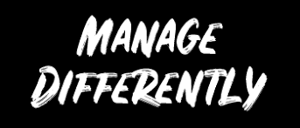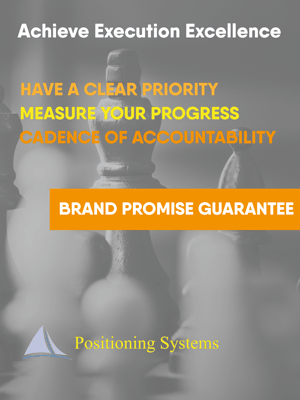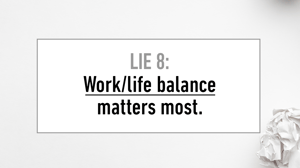
“There is no such thing as having potential. Or rather, there is, but it doesn’t mean anything.”
In Nine Lies About Work: A Freethinking Leader’s Guide to the Real World, Marcus Buckingham, and Ashley Goodall tell the story of Joe.
Who’s Joe?
In the early days of the internet, Joe, founded a pioneering yellow-pages company to integrate directory listings with mapping technology. He managed to secure backing from a venture-capital firm that evaluated all the existing executives on their potential for guiding the future of the company. Joe, they felt didn’t have the makeup for leadership, having never displayed leadership in his high school or college life. They determined he lacked the potential to set the future vision and to build the right team around him.
He was demoted to head programmer, where it was determined he would never become one of the company’s leading software engineers. He just didn’t have enough potential.
Frustrated with this diminished position and believing the investors didn’t see much of a future for him, Joe waited for the company to be acquired. He left to start his own financial services company.
His new company grew large enough for a big player to swoop in and buy it from him.
The new company leaders couldn’t see his potential, so he left again, this time to see whether he could do interesting work in the fields of mechanical and electrical engineering.
What do you feel? Does Joe Have Potential??
“Joe” is a pseudonym. His real name is Elon. That yellow-pages company was acquired by Compaq for $307 million. The financial-services company, X.com, became better known as PayPal and sold to eBay for $15 billion. His reinvention of the automobile industry (Tesla), his re-invigoration of the space industry (SpaceX), as well as his counterintuitive alarm-sounding of the dangers of AI all, appear to contradict those earlier appraisals, that Elon Musk doesn’t have potential.
It’s time to stop rating people on potential.
Potential
Nine Lies About Work shares, “Evidence for the existence of general potential is nonexistent. Instead, the evidence points in exactly the opposite direction. We know that each person’s brain grows by adding more synaptic connections, that each person’s synaptic pattern is unique, and that therefore each person’s brain grows uniquely.”
- The ability to learn exists in us all,
- It shows up differently in each of us, and
- While we can all get better at anything, none of us will ever be able to rewire our brains to excel at everything.
.jpg?width=300&name=9%20Lies%20and%20Truths%20About%20Work%20(Lies%20%231%20-%207).jpg) We can all get better, and we will all get better at different things, in different ways, and at different speeds.
We can all get better, and we will all get better at different things, in different ways, and at different speeds.
Potential doesn’t mean anything beyond being a human. To say that you have potential means simply that you have the capacity to learn, and grow, and get better, like every other human.
The authors go so far as to define hi-potential and low potential labeling as Immoral!
Low potential “explicitly stamps large numbers of people with a “less than” branding, derived not from a measure of current performance but from a rater’s hopelessly unreliable rating of a thing that isn’t a thing.”
Potential Problems
Potential is a one-sided evaluation. Momentum is an ongoing conversation. Momentum, on the other hand, represents the opposite of “up-or-out” thinking. And it’s the best concept to address one of the key survey items that measure engagement and performance: “In my work, I am always challenged to grow.”
Potential doesn’t do that—it doesn’t challenge you to grow. It tells you that you either will, or you won’t.
Addressing their potential makes people feel like they’ve been dealt with. Addressing their momentum makes them feel understood.
Invest in Managers
People, tools, and processes can never compensate for bad team leaders.
Teams are where we live, and team leaders can make or break that experience for us. Rather than investing in systems and processes to provide a fallback in case our managers are found wanting, Nine Lies About Work feel it’s far better to invest in helping our team leaders do what we need them to, by:
- Getting rid of ratings of “potential,”
- Teaching team leaders what we know about human growth, and
- Prompting them to discuss careers with their people in terms of momentum—in terms of who each team member is, and in terms of how fast each is moving through the world.
This is harder than buying the latest piece of enterprise software and imploring our people to use it, but it’s the right hard thing to do.
Self-investment, understanding yourself, understanding your people’s strengths and weaknesses is part of being a good manager. Watch Buckingham’s Identify Your Strengths video:
Managing Differently
Nine Lies About Work shares the results of an enterprising manager from Cisco who set out to help his team see what their futures could be like. 
He asked them to imagine their dream job, splitting them into pairs to search LinkedIn for the jobs closely matching their ideal. With their partner they narrowed the list to one or two roles they found most exciting. Then he asked them to analyze their jobs for their skills experiences and qualifications and compare them to those they already had in order to figure out the new ones they wanted.
He helped them to get clear on who they are, and where they wanted to go. He presumed everyone had momentum, and that his job was to help them figure out how to direct it.
“I think there’s a lot of energy within our teams that isn’t being used, and I have a lot of people who, given the right circumstances, the right engagements, the right customer—whatever it is, we can find what enables them to share that energy, to bring it out.”
“It changed the conversation,” he said, “from how we could get another job outside, to how we could build our practice to be the best professionals we could be—to deliver better service internally, but also to build up our transferable skills.”
Isn’t this what any true people maximizing company would want?
Growth demands Strategic Discipline.
 How can you build an enduring great organization?
How can you build an enduring great organization?
You need disciplined people, engaged in disciplined thought, to take disciplined action, to produce superior results, making a distinctive impact in the world.
Discipline sustains momentum, over a long period of time, to lay the foundations for lasting endurance. It’s the framework for Good to Great:
- Stage 1: Disciplined People
- Stage 2: Disciplined Thought
- Stage 3: Disciplined Action
- Stage 4: Build Greatness
Positioning Systems is obsessively driven to elevate your team's Discipline. A winning habit starts with 3 Strategic Disciplines: Priority, Metrics, and Meeting Rhythms. Your business dramatically improves forecasting, accountability, individual, and team performance.
Creating Execution Excellence demands creating/defining, understanding, with creativity, and DISCIPLINE your Flywheel.
Meeting Rhythms achieve a disciplined focus on performance metrics to drive growth.
Positioning Systems helps your business achieve these outcomes on the Four most Important Decisions your business faces:
|
DECISION |
RESULT/OUTCOME |
|
PEOPLE |
|
|
STRATEGY |
|
|
EXECUTION |
|
|
CASH |
|
We help your business Achieve Execution Excellence.
Positioning Systems helps mid-sized ($5M - $250M) business Scale-UP. We align your business to focus on Your One Thing! Contact dwick@positioningsystems.com to Scale Up your business! Take our Four Decisions Needs Assessment to discover how your business measures against other Scaled Up companies. We’ll contact you.
 Next Blog – Lie #8 Work-life balance matters most
Next Blog – Lie #8 Work-life balance matters most
The assumption pervading our working world is that “work is bad” and “life is good,” and therefore work-life balance matters most. Next blog we explore the TRUTH: Love-in-work matters most (Because that’s what work is really for.)






.jpeg?width=150&height=135&name=Hand%20with%20marker%20writing%20the%20question%20Whats%20Next_%20(1).jpeg)

